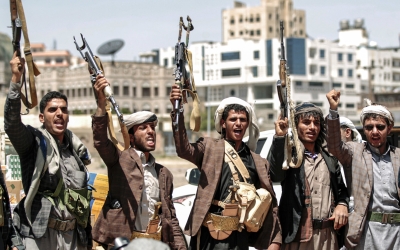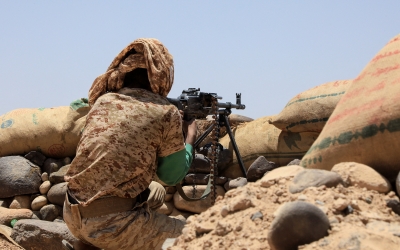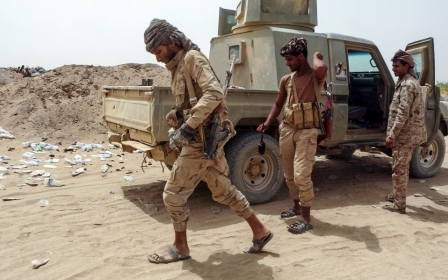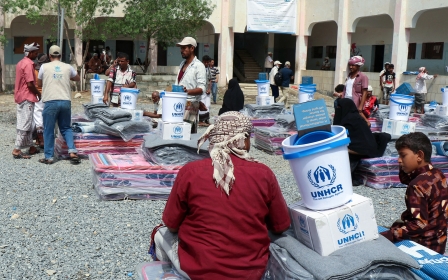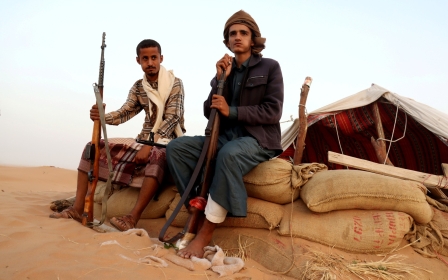Biden official meets Saudi crown prince days before anniversary of Khashoggi killing

US national security adviser Jake Sullivan held talks about the war in Yemen on Tuesday in a meeting with Saudi Crown Prince Mohammed bin Salman, just days before the third anniversary of the murder of Middle East Eye columnist Jamal Khashoggi.
Sullivan is on a trip this week to Saudi Arabia, the United Arab Emirates (UAE) and Egypt along with the US special envoy to Yemen, Tim Lenderking and Biden Middle East envoy Brett McGurk.
Sullivan also met Deputy Defence Minister Khalid bin Salman, Interior Minister Abdulaziz bin Saud bin Nayef and National Guard Minister Abdullah bin Bandar, among others.
"They had a detailed discussion of the Yemen conflict, and both parties endorsed the efforts of the new UN Special Envoy to Yemen Hans Grundberg and agreed to intensify diplomatic engagement with all relevant parties," a senior administration official told Reuters.
"Special Envoy Lenderking will remain in the region to follow up on the detailed discussions."
Ahead of the meeting, a person familiar with the delegation's plan told NatSec Daily that Lenderking planned to ask some tough questions to the Saudis. "The goal is to get to a ceasefire," the source said.
As a presidential candidate, US President Joe Biden had condemned Saudi Arabia and called it a "pariah", joining much of his Democratic Party in calling for a rethinking of Washington's ties with the kingdom.
But since taking office in January, he has refused to impose sanctions on bin Salman following the release of a US intelligence report that described the Saudi crown prince's alleged involvement in the murder of Khashoggi on 2 October 2018.
Sullivan, will have meetings in Cairo on Wednesday with Egyptian officials about human rights, Libyan elections and Israeli-Palestinian relations, the White House said in a statement on Tuesday.
Risk of famine
The war in Yemen erupted in September 2014 when the Houthis, who claim to represent the Yemeni people, seized the capital, Sanaa, sparking a civil war that forced President Abd Rabbuh Mansour Hadi to seek refuge in Aden and then Saudi Arabia.
The kingdom and its regional allies, chiefly the UAE, intervened in March 2015 and launched a wide-ranging aerial bombing campaign, carrying out thousands of air strikes in an effort to roll back the rebels.
The coalition also introduced an air and naval blockade that it says prevents the Houthis from smuggling weapons into the country.
The UN and several human rights groups have said the blockade has heavily restricted the flow of aid and goods from coming into the country, putting millions at risk of famine.
Fighting intensifies around Marib
After more than six years of war, Yemen is frequently described as the world's worst humanitarian crisis, with more than 230,000 people killed, an estimated four million displaced, and around 80 percent of the country's 29 million people dependent on aid for survival.
The situation has deteriorated in the last few months, with Grundberg warning that the country is "stuck in an indefinite state of war".
Fighting has intensified around the key city of Marib in recent months, with the Houthis trying to oust the internationally recognised government from its last urban stronghold.
Hundreds of fighters have died this month alone after the Iran-aligned rebels renewed their campaign for the oil-rich region.
Saudi Arabia had offered a ceasefire proposal to the Houthis earlier this year as it looked to rehabilitate its image with the administration of US President Joe Biden.
But the proposal was rejected by the Houthis who said it fell short of their demand for a complete lifting of the blockade on Sanaa airport and Hodeidah port.
Khashoggi death
Khashoggi was killed inside the Saudi consulate in Istanbul on 2 October 2018 after he entered the premises to obtain paperwork for his planned marriage to his Turkish fiancee, Hatice Cengiz. His remains are yet to be found.
Saudi authorities had initially insisted that Khashoggi left the building alive, taking two weeks to acknowledge that the journalist had been killed.
Riyadh claims that the assassination was a rogue operation that happened without the approval of top officials.
Following the release of the US intelligence report, Biden announced that he would communicate directly with King Salman, not with his son, the crown prince. But King Salman, 85, has largely stepped back from an active role in diplomacy and government and spent some time in hospital last year.
Meanwhile, the crown prince serves as the country's defence minister and is in overall charge of the Saudi economy and its investment funds. He routinely meets visiting foreign dignitaries and conducts diplomacy with foreign leaders and is considered to be the kingdom's de facto leader.
A senior Biden administration official told the AP news agency that the White House had determined that ending the war could not be done without engaging face to face with the most senior Saudi officials.
Middle East Eye delivers independent and unrivalled coverage and analysis of the Middle East, North Africa and beyond. To learn more about republishing this content and the associated fees, please fill out this form. More about MEE can be found here.


